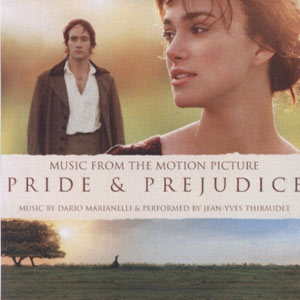Pride & Prejudice
Music composed by Dario Marianelli
Featuring Jean-Yves Thibaudet (piano) with the English Chamber Orchestra conducted by Ben Wallfisch
Available on UCJ (Universal Classics & Jazz) (987 3100)
Running Time: 41:30
Crotchet

We received an advance promotional copy of this soundtrack recording in very early August in advance of the film although pre-publicity for the film was already gaining momentum in the press which suggested that this would be a somewhat different approach to Jane Austen’s classic reflecting a social realism. Well we will reserve judgement on that concept. Thankfully Dario Marianelli’s music is redolent of the refinement and elegance of the era in which the story is set.
The overall mood is of cosy intimacy, the material often coy, whimsical, sometimes poignant, mostly in slow tempi except cantering rhythms for such cues as ‘Can’t Slow Down’, or rustic folk dance or marching music (The British Grenadiers is referenced in ‘The Militia Marches’). Classical music lovers will enjoy a game of spot the influences in this delightful score ranging from the formal decorative 18th century classical styles through Beethoven and Chopin and the early Romantics to even the impressionism of Debussy or the carefree insouciance of Poulenc, both subtly suggested in the opening pages of Arrival at Netherfield’- before the music scampers off in high spirits in the style of Beethoven or Schumann. There is an overt reference to Purcell’s Rondeau from his Abdelazar (better known as the theme of Benjamin Britten’s Variations and Fugue on a Theme of Purcell – Young Person’s Guide to the Orchestra).
The music is performed most sympathetically by the English Chamber Orchestra with sensitive and expressive solos by the French classical pianist, Jean-Yves Thibaudet.
Derivative but nonetheless quite enchanting
Ian Lace
3.5
Return to Reviews Index